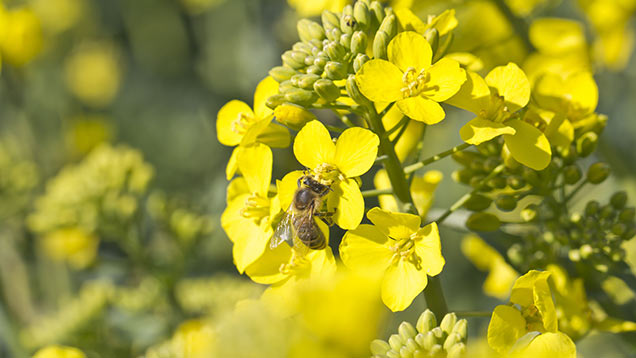Bee expert casts doubts on Defra neonics field study
 ©WestEnd61/Rex
©WestEnd61/Rex A government field study, which concluded neonicotinoid pesticides do not harm bees is flawed, a leading bee scientist has claimed.
The UK’s Food and Environment Research Agency (Fera), an executive agency of Defra, published a study in 2013 into the impact of exposure of bee colonies to neonicotinoids.
The study concluded that there was no significant link between colony performance and pesticide exposure.
See also: Doubts raised over neonic ban as scientists clash
Defra has used the study as evidence to support its view that the current two-year EU ban on neonicotinoids is unjustified and not based on “sound science”.
After the Fera study was published, former Defra secretary Owen Paterson said: “We did not see grounds for a ban based on our field trial data.”
The European Food Standards Agency (Efsa), the EU food safety watchdog, subsequently reviewed the Fera study and raised concerns about how the authors had “elaborated and interpreted” their results.
Now a leading UK bee scientist has re-analysed the data set used to compile the Fera study and concluded it does show a “negative relationship between both colony growth and queen production and the levels of neonicotinoids in the food stores collected by the bees”.
Dave Goulson, a professor of biology at the University of Sussex, said despite the conclusions drawn by Fera, their data appeared to provide the first clear evidence that bees exposed to neonicotinoids in the field suffer “significant impacts in terms of reduced colony growth and queen production”.
Prof Goulson said the Fera data clearly showed that queen production was lower in bee colonies exposed to higher concentrations of neonicotinoids.
“This experiment shows clearly that bumblebees on normal working farms in the UK are exposed to mixtures of neonicotinoids, and that the dose they receive is sufficient to reduce nest growth and reduce the number of queens produced,” he added.
“Even doses of clothianidin below 0.3 parts per billion appear to be enough to do significant harm.”
Prof Goulson said it was concerning that the same data set could be interpreted in “wildly contrasting ways” by different scientists, because this was likely to undermine confidence among the general public in the scientific process.
The Fera study was never peer-reviewed, a process which, although not perfect, provided “some degree of quality control”, he added.
Prof Goulson encouraged policymakers to base their decisions on peer-reviewed research wherever possible.
Trevor Mansfield, head of policy at the Soil Association, said: “What this shows is how data can be used to support different positions.
“That’s why we think it is vital that Defra commits to publishing the results – in full – of the research it has funded on neonicotinoids and to not making any long-term decisions on their future in the UK until academics and wider society have had a good opportunity to review that data and draw their own conclusions.”
The European Commission introduced a two-year moratorium in December 2013 for the use of three neonicotinoids – imidacloprid, clothianidin and thiamethoxam – on seed dressings for bee-attractive crops, including oilseed rape, maize and sunflowers.
Defra, the NFU and agrochemical companies continue insist the ban is based on “unsound science” and should be overturned.
A Defra spokesman said: “Bees and other pollinators are vital for the environment and our food production and we want to make sure they are protected now and in the future.
“Our national pollinators strategy recognises that pesticides are one of the potential pressures they face, and we have implemented restrictions on their use.
“We are aware of the new analysis of the era study into the effects of pesticides on bees.
“We continue to work closely with the EU and our independent Advisory Committee on Pesticides to review any new research into the effects of neonicotinoids on bee populations, ensuring it is based on the best scientific evidence available.”
A Fera spokesman said: “In the executive summary of our 2013 report we clearly stated that our experiment lacked the power to reach any firm conclusions about the impact of seed-coated neonicotinoids on bumblebee health.
“Whilst there was an absence of evidence to support the hypothesis that neonicotinoids harm bees, this does not lead to the conclusion that they are benign.”

